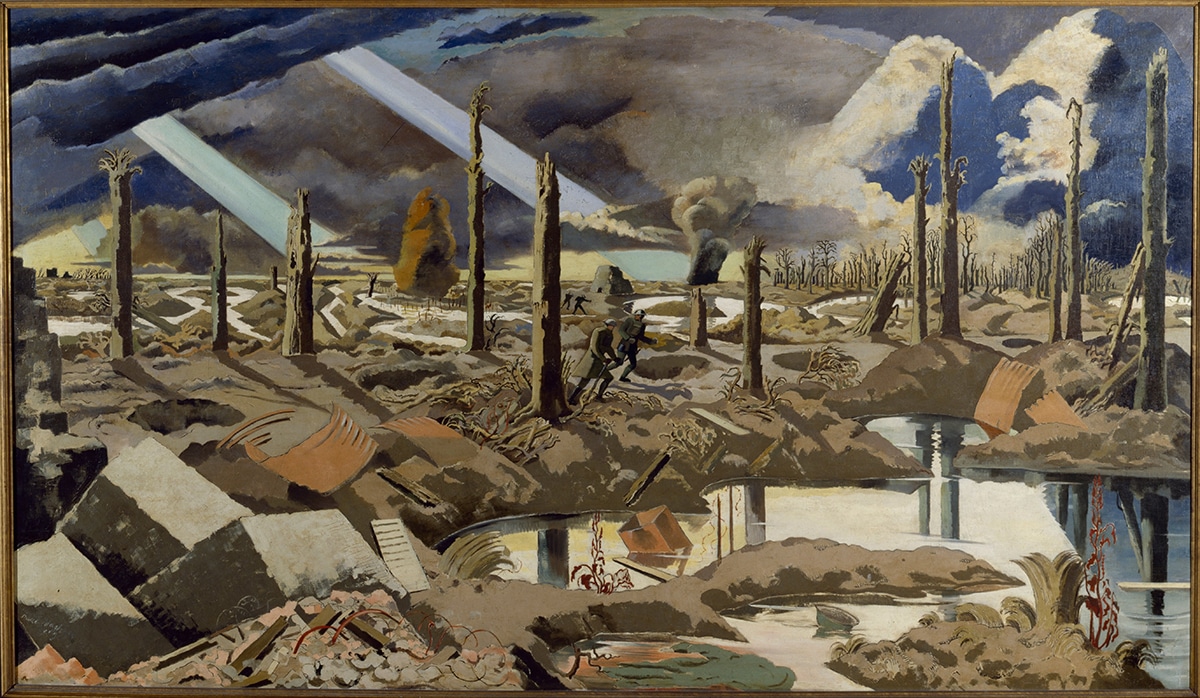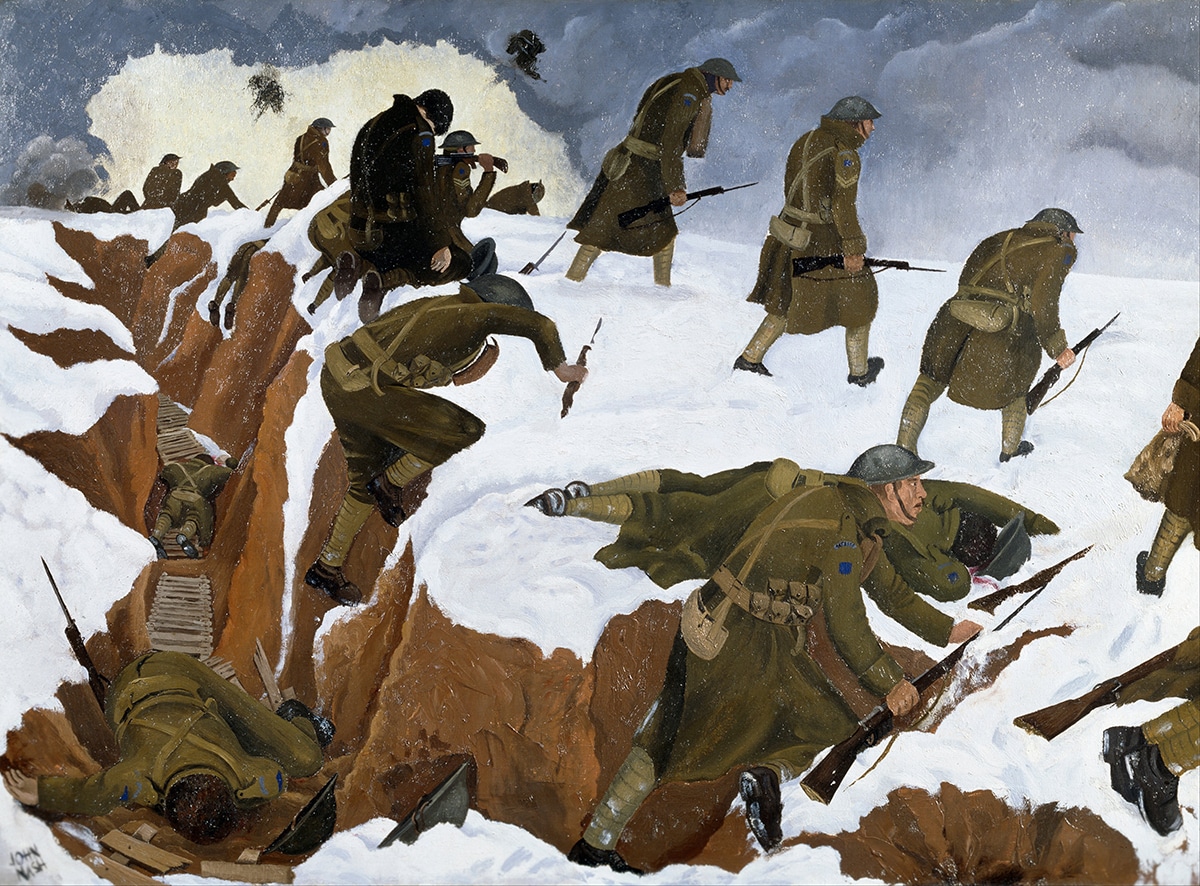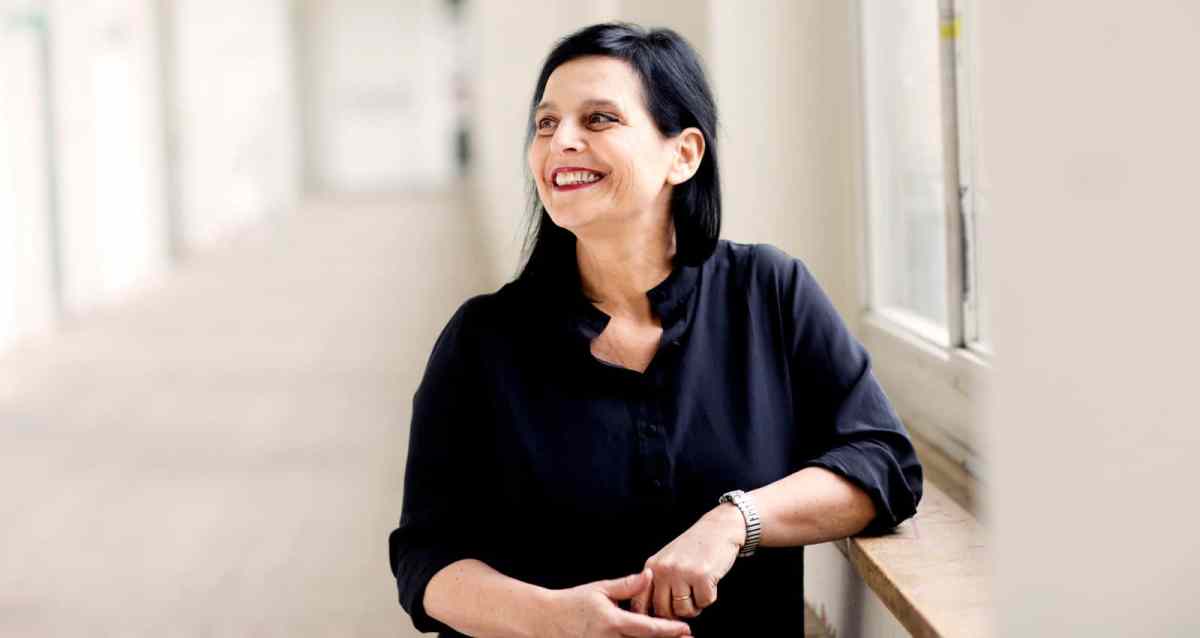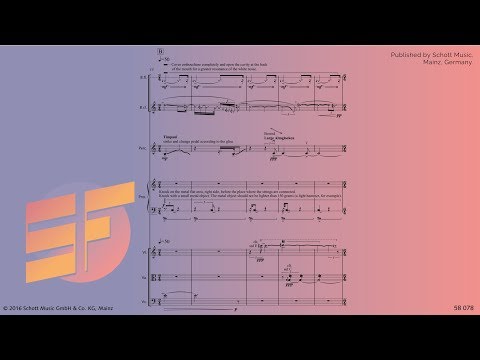In the first week of February, I talked to composer Chaya Czernowin, my professor in composition at Harvard University, about her upcoming opera “Infinite Now,” which is due to be premiered in Ghent in April 2017, followed by performances in Antwerp, Mannheim, and Paris. Drawing texts from Can Xue’s story “Homecoming” and Luk Perceval’s play “Front,” which is based on All Quiet on the Western Front by Erich Maria Remarque, “Infinite Now” represents Czernowin’s largest-scale undertaking to date.
VAN: In the 20th century composers tended to avoid calling a piece of theater an “opera”—I’m thinking for example of “Prometeo” (“tragedy of listening”) by Luigi Nono, “Neither” (“anti-opera”) by Morton Feldman, “Die glückliche Hand” (“drama with music”) by Arnold Schoenberg, or most of the stage works by Luciano Berio. When you talk about “Infinite Now” you say “opera.” What makes this piece an “opera”?
Chaya Czernowin: You know, when I wrote “Pnima,” I also called it an “anti-opera.” I think that at that time I was very attached to the progressive, and I even said to people that I hated opera—which was not completely accurate because, for example, listening to “Pelléas et Mélisande” by Debussy actually changed my life. Sometimes I would call “Infinite Now” a work of music theater, but the truth is that I feel that there is something very conclusive, total, about the piece, because it uses so many means. As opposed to a string quartet, where you have four instruments that actually are an atomic family, four individuals speaking almost with the same voice, “Infinite Now” is the place where you are given all the means in abundance, a kind of euphoric abundance of everything you could be, in a way, a stage for all your ideas. That was how I came to view “Infinite Now,” after a while.
And for me, that is really connected to the experience of an opera. There is something which is very holistic about it—it is not merely the abstraction that music can give you, but it really is connected to life, in a way. It brings voices from reality. I use a lot of field recordings: there are places where you have 10 layers of field recordings from different kinds of experiences that you can actually not even decipher. You have so many things that are happening, which create a kind of magma or a mini-reality. And that for me is one of the operatic aspects of the piece.

So why is “Pnima” an anti-opera and “Infinite Now” an opera?
“Pnima” was an eruption of emotions, a psychological growth over a long time. But at that time, my means were very restricted: two women, two men. In “Infinite Now” I have a trio—and while the difference between a duo and a trio seems small it is actually huge. A trio is actually a group. So, I had those two duos, six soloists and a string orchestra, which is almost a magnification of a string quartet. My approach fittingly was one of focus and abstraction. In some ways, “Infinite Now”—which came 16 years after—is a response to myself, to “Pnima”; “Pnima” is my debt to my past and to my family; “Infinite Now” is my debt to my future and to who I have become.
Our political present, our “now,” represents an extremely difficult moment for humanity. I feel like composers have no role in contemporary society and our music does not have the same meaning that it had in the past, for example, when it was possible for the premiere of Luigi Nono’s work “Intolleranza” to be interrupted by a group of neo-fascists.The topics you used for your operas, “Pnima,” “Zaïde/Adama,” and “Infinite Now,” are very political. How does a composer like you deal with the current political situation? Is there even a meaning for what we are doing?
Well, it’s a very important question, and it can be a very long answer. A little while ago, I was talking with my son Ko about political movements, their power, and also their corruption of power. When we are in a group, a political group, we are active, we can contribute. The group can become strong and then acquire power. And my son Ko said to me, “this is where the art comes in,” because when a political change is needed we need the power of the collective. But later, and also at the same time even, we do need to regain a path to our individuality. At that moment you need the presence of the artists to split these two things up again, and help society in regaining that path. The collective is very important for making change happen, but then the balance of collective and individuality is necessary for our existence. This is where we come in. I don’t have so much trust in works of art which serve a political purpose—I’ve always been very suspicious of them, even though I understand that they are needed. In new music I always believed that individualization is one of the most important parameters.
Chaya Czernowin, “Ayre: Towed through plumes, thicket, asphalt, sawdust…”; Norrbotten NEO, Pierre-André Valade (Conductor)
You write that “Infinite Now” is an “experience, a state: in the midst of a morass, the presence of an imminent disaster.” I had the privilege of listening to the recording of the first half of the work, and I kept asking myself why I could not feel the presence of that “imminent disaster.” Everything felt safe, nearly familiar. But then I started to wonder whether your intention was to create an environment where you feel protected, where you can almost build memories.
Yes, exactly!
The latest from VAN, delivered straight to your inbox
Will the “disaster” follow this part?
Well, it is very interesting. I think that in “Infinite Now” I discovered different kinds of time. I call it “the time within the wrinkle”—I am listening to something which is happening in real time, but as I am listening to it, I realize that at the end of my field of listening there is something that is almost unrecognizable but that takes my ear. I zoom in on it, and as I do, it opens up and I discover a whole new gamut of things inside it. Now, this is not an addition, because it was there the whole time, but I am now just stopping that small sound and I am exploring the inside of it. As it unfolds, there is another onion-layer that comes from a totally different direction that didn’t even register when I was listening to the big flow stream of the initial river. And that is why I call it wrinkle, because you go inside a point in time and you discover that what you thought to be just a small detail is actually a whole physical presence of a universe of multiplicities, of heterogeneous happenings.
From the beginning, I knew the piece was going to be very long, and I also knew I did not want a climax at the end. In “Infinite Now” everything is building, building, building, and from the middle point on (where the breathing comes in) you begin to understand its direction, even though the flow is not at a constant rate. From a certain point, where your legs seem to be very strongly planted on the ground, because you are given many structural icons you can trust—every act starts the same way and has a very similar construction— everything becomes more and more alien, suddenly the two texts begin to relate to each other, and you end up on the smallest island of strangeness that you have never been able to see because it’s so hidden from your eye, but you are very safely getting to it. Everything goes there, and it is not like the two themes have been integrated to celebrate their unity. There is an inevitability in this opera that becomes stronger and stronger the more we continue to go. That is my hope.
So what I heard at the end of the third act is breathing, not sleeping?
It’s breathing.
If I look at the texts you use there is an internal space [“Homecoming”]—which is represented both by the psychological struggle of the female character and the fact she is physically trapped in her house—and an external space, the war [“Front”], the letters written by soldiers. These texts are all written in the past, but they become real again in the moment they are read in your opera. And then—but this is because I interpreted the breathing for sleeping—exactly when we hear the recording of the BBC news, which represents our present, we are sleeping. But you are telling me it’s just breathing, right?
Well, I don’t mind so much how you interpret it. Sleeping is a very interesting state. I asked my collaborator Carlo Laurenzi to give every breath its own individuality, highlighting different registers through reverb or dryness or careful slight filtering, and I created the timing in such a way that the breathing becomes a hyper-realistic state of utmost intimacy that has to do with our non-controlled mechanism. Again, it’s a kind of a wrinkle in our perception because when we zoom into that very essential and preliminary state, it can be a symphony. It doesn’t matter if it’s sleeping or breathing, what’s really important here is the moment when you succeed to get into this intimacy because the music compels you to start listening to all those details (you almost smell the mouth of the person breathing), and then you have the BBC News jingle approaching. It’s not coming as a huge contrast, it comes very softly, but it is so foreign, and that is exactly the place where politics come into the world for me.

In “Infinite Now” you use many field recordings. It’s particularly powerful when you are able to recognize not only the sound source of the recording, but the space where it first took place. It is almost like a window opens at that particular moment and we are suddenly projected elsewhere. This does not quite happen within the live instrumental music though, which seems to have its own space. So, how is the space within the texts reflected in the music?
It’s very strange because these spaces, in a way, are a kind of living architecture, and let me explain what I mean by that. Every act starts with this material of a metal gate closing. Of course, none of them are the same, it’s kind of a developing variation, some of them are extremely reduced and simplified, but it’s a very clear signal: we are in the next act. And before those gates there is always a 12-second break.
You mentioned that in “Infinite Now” time does not flow linearly, but the way you explain the structure of the opera is extremely linear—we start always from the same point (the gate closing), the breath that becomes the wind, etc. Every element seems to develop smoothly. Can you please elaborate on that?
I hope I can find the right way of putting this into words. You have elements A, B, C, and variations of these. Moving between these As-Bs-Cs you begin to get something which is linear and not linear at the same time because you are basically repeating them, but repetitions are just not the same. So, the sameness, the not sameness, and the repetition find a kind of a new meaning. That something is a huge structure that is repeated and it’s reinterpreted and then it’s reinterpreted again. And the way that the reinterpretation works is that, even though the constraints of what is repeated is still clearly identified with what it was before, every repetition directs you much further away, but you feel that you are on safe ground because you can recognize a certain element of repetition. This allows me to take the listener to very alien places gradually, not as a contrast, and also not as a clean process.
What happens in the second half of the opera?
I can give a short attempt to describe it, but it’s hard to put it into words. In the fourth act the two material sources begin to work together, and at a certain point they even kind of answer each other; suddenly they find themselves in the same universe. From there, that universe is beginning to act. That is what I call living architecture—it’s not enough that you build this huge space, palace, hollow, whatever you want to call it, at a certain point it or they begin to wake up and move, they begin to do something, which is why they were created. Then comes the fifth act, where all the voices, the train, the breathing, all these kinds of air sounds become a desert of wind. The whole opera house becomes like a desert which contains all the wind in the world. And within that wind the orchestra begins to push, and we reach a place which I call “the rocks,” where you are suddenly in a huge space and you just have these very isolated rocks. The sixth act is the place where music actually begins to talk with all the energy that it took from before, from all the extra-musical things. Suddenly the music has the way of talking which for me encapsulates everything we heard before with a new focus. And when this is done, we are in a place where the woman [from the “Homecoming” section] is adjusted, so to say, and Paul Beumer is talking about how the reality was so powerful and so terrible at the time of the war, and he says “Leben, aber das Leben” [“life, but life”], and in that moment, out of nothingness and desolation, life starts to appear.
Having heard the first half, I was expecting destruction, but you transformed it into a void.
You know, it is a way of finding life and continuation in the most restricted place, not through the contrast, not through the fight, not through the outward resistance, but through the understanding that—and I am saying it now in a very extreme way—that even if we will not exist anymore as human beings, the ants will live on! I know it sounds very optimistic. [Laughs.]
One of the questions I had while listening to the first half of the opera was, How it would end? Does life continue after war, or does it stop and it’s just time that keeps going? Can we dare ourselves to keep living?
Yes, basically it is a metaphor for the person whose life was ripped apart, and how to continue, how to find that one tissue of emotion, of place that you can actually hold on to and continue. In the craziness, in the most alien possibility, to still have something you can hold on to, a ground from which you can later move on. ¶
Subscribers keep VAN running!
VAN is proud to be an independent classical music magazine thanks to our subscribers. For just over 10 cents a day, you can enjoy unlimited access to over 875 articles in our archives—and get new ones delivered straight to your inbox each week.
Not ready to commit to a full year?
You can test-drive VAN for one month for the price of a coffee.



Comments are closed.